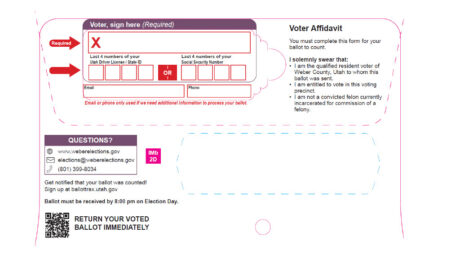Community members, state reps discuss DEI legislation at Ogden ‘ethics slam’

Ryan Aston, Standard-Examiner
State Rep. Katy Hall and Betty Sawyer, head of the Ogden branch of the NAACP, talk after an ethics slam event at Grounds for Coffee in Ogden on Tuesday, April 2, 2024.OGDEN — An “ethics slam” co-sponsored by the Richard Richards Institute for Ethics at Weber State University, the philosophy clubs at Utah State University and Weber State, as well as Grounds for Coffee was held at the coffee chain’s Harrison Boulevard location Tuesday.
The topic of discussion was Utah’s controversial diversity, equity and inclusion legislation, House Bill 261, which “prohibits an institution of higher education, the public education system and a governmental employer from taking certain actions and engaging in discriminatory practices,” per the bill’s language (which also references DEI specifically), and will become state law on July 1.
A large crowd filled the shop to exchange their ideas on the legislation’s impact which, according many of those who attended, is damaging to marginalized people and the effort to build an inclusive and equitable society in general. However, a variety of viewpoints were shared throughout the evening.
“We love to continue to see a wide range of people from the community come out to these,” Rachel Robison-Greene, an assistant professor at USU and one of the event’s moderators, told the Standard-Examiner.
Ground rules were established at the outset to preserve a thoughtful, respectful discourse throughout the night. And, for the most part, the event proceeded along those lines, save for a handful of tense moments.
Rep. Katy Hall, R-South Ogden, the bill’s chief sponsor, was one of multiple state legislators on hand to participate in the discussion. She also offered an explanation of the legislation’s origins and intent, and engaged with citizens who both were in support of and opposed to it.
Hall cited concerns over required DEI training and forced commitment statements with job applications and for school admissions promoting what she feels is deferential treatment, as well as a purported quelling of open discussion and free speech on university campuses.
“We have to focus on the approach to equality by making sure there are no barriers to entry or unfair delivering of resources, of these sorts of things, and the process is transparent,” said former Utah GOP Chairman James Evans. “When you mandate an outcome saying for diversity’s sake you end up causing more harm than good.”
Opponents argued that, regardless of intent, the legislation has opened the door to the unraveling of institutions that provide consideration and opportunities to people who might not get them otherwise, in addition to fostering a greater understanding between people of different races, cultures, genders, socioeconomic statuses, abilities, religious backgrounds, sexual orientations and more.
“I am here because of DEI, and I don’t have a problem saying that,” said Rep. Angela Romero, D-Salt Lake City, the state Legislature’s minority leader. “It wasn’t because I was not as smart as my white peers, it’s just that the opportunities were different.
“What DEI did and equity does is it opens doors to give people the opportunity. It has nothing to do with putting one group over another group. If you don’t look at the history of the United States of America and how racism is within that social fabric, you’re lying to yourself.”
For her part, Ogden School Board member and state senatorial candidate Stacy Bernal was one of many who likened H.B. 261 to legislation in Florida that has resulted in DEI positions, events and entire programs being eliminated, recounting the experience of a relative in the state.
“DEI is not solely about race,” Bernal said. “I have a niece who is attending college at UCF in Florida. She received a notification that they could not hold a women’s conference that she was supposed to attend as a student because it was considered under the umbrella of DEI.”
Meanwhile, Hall noted that while H.B. 261 was being built, its proponents in the Legislature had received a level of support from local educators.
“When (a previous version of the bill) failed last year, I started getting emails from professors across the Wasatch Front, saying, ‘Please keep going on this. You’re on the right track. There is something happening on our university campuses that’s kind of taken off in the last five years, and we feel like it has stifled speech.'”
Pressed by attendees and moderators for more details on efforts that may or may not have been made by legislators to consult with educators about their own experience with DEI, plus the bill’s scope and framework, Hall clarified that she had only communicated with those who had reached out.
Organizers of the event, the 22nd of its kind to be held recently, told the Standard-Examiner that there would be another ethics slam in Logan in the coming weeks, during which artificial intelligence would be discussed.
Details for that event will be announced at a later date.



